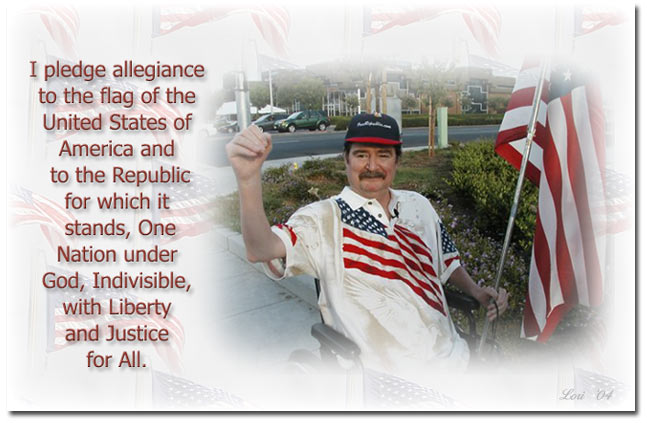|
|
|
|
|
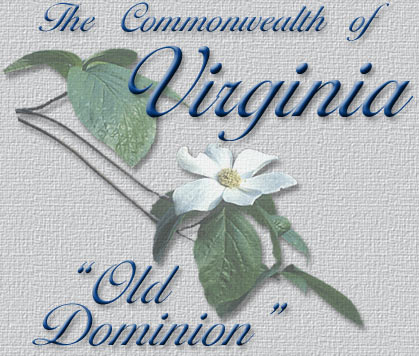
Named for England's "Virgin Queen," Elizabeth I,
Virginia entered into the Union on June 25, 1788,
the 10th of the original 13 colonies.
On April 17, 1861 Virginia would secede from
the Union and Richmond would be named
as the Capital of The Confederate States.
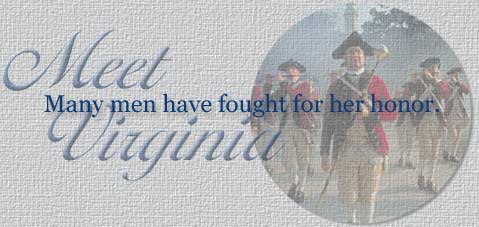
"The story of Virginia is the story of us all. It is the story of rich and poor, farmers and industrialists, men and women, black and white. It is the story of successive struggles for freedom and equality that both foreshadow and mirror the story of America. It is the story of individuals who through the centuries forged new identities through compromise and conflict."....excerpt from a book review of "The Story of Virginia", By James C. Kelly.

A condensed timeline of
Virginia's rich history...
1607—The first permanent settlement is established at Jamestown...
The Story of
John Smith and Pocahontas
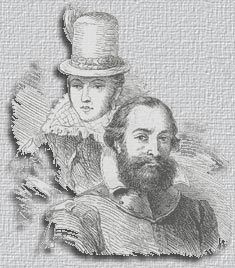
The Jamestown colonists decided that only one man had enough leadership or experience to lead them. That man was John Smith. Smith took responsibility for exploring the surrounding environs, traveling up several of the region’s many rivers. He prepared a remarkably accurate map, based on his excursions. Smith also became the chief contact with the neighboring Native Americans, Algonkian-speaking members of the Powhatan Confederacy. In December 1607, Smith was abducted by tribal members. According to one of Smith’s accounts, he was rescued from execution by the pleas of the chief’s daughter, Pocahontas. Later authorities have speculated that Smith simply misinterpreted an Indian adoption ritual.
Pocahontas ("playful one"), maintained friendly relations with the Jamestown settlers, bringing them food and warning them of an impending attack by her father’s warriors. In 1613, an English official attempted to retrieve settlers imprisoned by Powhatan by luring Pocahontas aboard a ship and holding her hostage. Although she was reputedly the chief’s favorite daughter, he refused to exchange prisoners. Pocahontas remained in captivity, was converted to Christianity, took the name Rebecca and in 1614, with her father’s consent, married colonist John Rolfe. This marriage ushered in an eight-year period of improved relations between the Indians and the colonists.
Officials of the Virginia Company seized upon the Pocahontas story and devised an early form of a public relations campaign. The Rolfes, their infant son and several other natives were taken to England as guests of the company. Pocahontas was a sensation in English social circles. The Virginia Company hoped that interest in their colony would be enhanced by their proof that Indians could be "civilized."
Pocahontas died in 1617 at the age of 22 while preparing to return to Virginia and is buried at Gravesend. Her son Thomas Rolfe was educated in England, but later went to Virginia where he enjoyed great business success and was the forebear of many of the colony's most distinguished families.
1619—Establishment of the House of Burgesses.
1624—Virginia Becomes a Royal Colony (Virginia Company charter revoked).
1674—The Bacon rebellion fights for colonial rights in Western Virginia.
1693—The College of William and Mary founded at Williamsburg.
1698—October 31, A fire destroys Jamestown, the seat of government is moved to Williamsburg (in 1699).

The Revolutionary War (1775-1783)
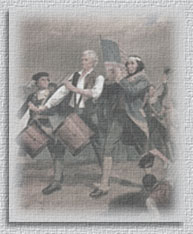
In March 1775, Patrick Henry urged his fellow Virginians to arm in self-defense, closing his appeal (uttered at St. John's Church in Richmond, where the legislature was meeting) with the immortal words: "I know not what course others may take; but as for me, give me liberty or give me death."
Click here to listen to
Patrick Henry's Famous Speech
(performed by Richard Schuman as the character
of Patrick Henry for The Colonial Williamsburg Foundation.)
1776—Virginia adopts its first constitution and declares independence.
1788—Virginia becomes the 10th state.
1831—Nat Turner leads a slave revolt.

The Civil War in Virginia
Richmond was capital of the Confederate States of America from May 1861 until April 1865 - only one hundred miles or so separated the two warring capitols, and thousands died fighting at places no one had heard of before, places like Cold Harbor, Chancellorsville, Malvern Hill, Spotsylvania, Brandy Station and the North Anna River. More fell during encounters at places that had no name.
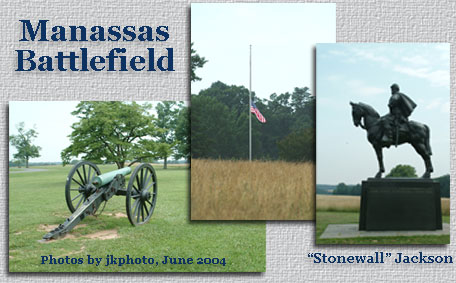
"First Manassas" is remembered as the first major land battle of the Civil War, won by inexperienced Confederates who routed an equally raw Union force. Confederate Gen. Thomas J. Jackson became "Stonewall" for his role in the fighting. The second battle at Manassas, the battle of Bull Run, also a dramatic Confederate victory, was much bloodier. More than 3,000 soldiers were killed during the battle.
Richmond Falls.....
"Through the winter and early spring of 1865, while Union armies ranged at will across the South, Richmond still glittered with the hard defiance of a city long at war. But this last flicker of resolve only made the city's fall all the more devastating. On the night of April 2, faced with the inevitability of northern victory, Jefferson Davis and his cabinet fled, leaving Richmond to its fate—fire, capture, and the end of hope for a southern nation."....excerpt from a book review of "Richmond Burning", By Nelson Lankford.
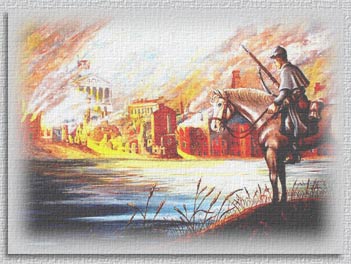
1870—Virginia re-enters the United States with Richmond as her capital.

 Famous Virginians
Famous Virginians
Virginia has supplied more presidents to the United States than any other state. The following were born in The Old Dominion.....
* George Washington
* Thomas Jefferson *
* James Madison *
* James Monroe *
* William Henry Harrison *
* John Tyler *
* Zachary Taylor *
* Woodrow Wilson *
More Fine Virginians...
Richard Arlen actor, Charlottesville
Arthur Ashe tennis player, Richmond
Pearl Bailey singer, Newport News
Warren Beatty actor, Richmond
Richard E. Byrd polar explorer, Winchester
Roy Clark country music artist, Meaherrin
William Clark explorer, Caroline Cty
Henry Clay statesman, Hanover Cty
Joseph Cotten actor, Petersburg
Ella Fitzgerald jazz singer, Newport News
Patrick Henry statesman, Hanover Cty
Sam Houston political leader, Rockbridge Cty
Robert E. Lee Confederate general, Stratford
Meriwether Lewis explorer, Ambemarle Cty
Shirley MacLaine actress, Richmond
John Marshall jurist, Germantown
Cyrus Hall McCormick inventor, Rockbridge Cty
Opechancanough Powhatan leader
John Payne actor, Roanoke
Walter Reed army surgeon, Gloucester Cty
Matthew Ridgway Army Chief of Staff, Fort Monroe
Bill Bojangles Robinson dancer, Richmond
George C. Scott actor, Wise
Sam Snead golfer, Hot Springs
James Jeb Stuart Confederate army officer, Patrick Cty
Thomas Sumter General, Hanover Cty
Nat Turner leader of slave uprising, Southhampton Cty
Booker T. Washington educator, Franklin Cty
|
|

July in Virginia means it's that time again for some of the most popular festivals known around the world.
And with the unveiling of the National World War II Memorial in Washington, D.C., Northern Virginia presents 17 historic sites to honor "The Greatest Generation" on the World War II Heritage Trail.

After having visited this state on my recent vacation, I can attest to the fact that Virginia is a perfect vacation destination!
Click on the region you plan to visit, and be
sure to allow LOTS of time and wear comfortable shoes:Shenandoah Valley | Eastern Shore | Central Virginia
Northern Virginia | Heart of Appalachia
Blue Ridge Highlands | Chesapeake Bay | Hampton Roads
And while you are visiting Virginia,
keep your eye out for their state symbols...


The following websites provided
graphics, information and text...
Virginia is for Lovers
50 States.com
Virginia - America's Story
The Civil War Traveler - Virginia
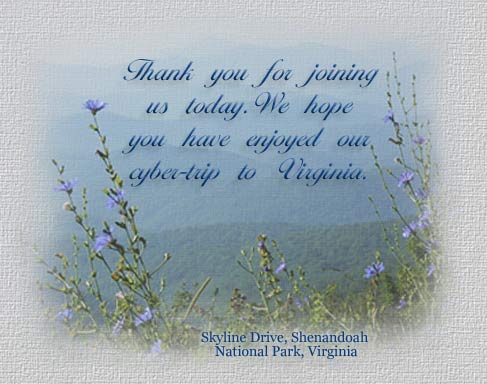
Have a Fine Wednesday!
|
|
|
|
|
|


